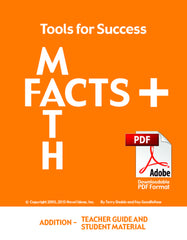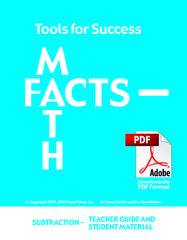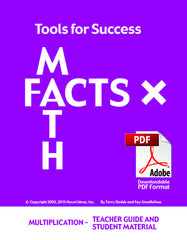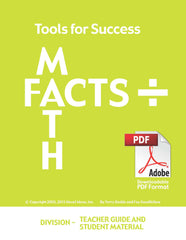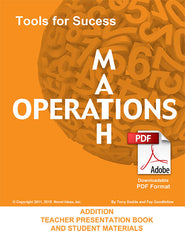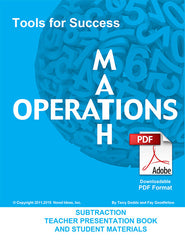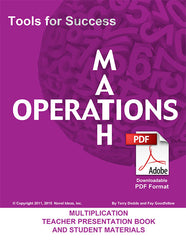Tools for Success - Math Programs

Knowledge of basic math facts is an important factor for success in mathematics. Often students who are experiencing difficulty in mathematics are students who have not mastered the basic math facts at a speed and accuracy rate that allows them to complete calculations efficiently and accurately. Students who are dependent on counting on their fingers or on the use of counters often lose track of the flow of multi-step problem solving.
The focus of Tools for Success: An Oral Math Facts Program is on specific direct instruction strategies and repeated practice for learning basic math facts that teachers, parents, and homework providers can use to increase student success in mathematics. This basic fact program is non-age specific and may be used each year to “tune-up” students’ basic fact skills as they review and learn more about computation. A 15 minute daily routine of oral math fact drill offers students consistent practice that is efficient, interesting, and motivating.
Tools for Success: An Oral Math Facts Program requires that students reach mastery of a specific set of facts orally before moving to the next level of the program. Written tests are administered after a student has mastered Level Z of any operation. Student practice books provide a consistent and easy to use format.
Program Components for Each Module
- Teacher Guide
- Strategies for teaching related math facts
- Blackline Masters
- individual Student Progress Chart
- placement tests
- written mastery tests
- home/school communication notes
- certificate of achievement.
- Reusable Student Practice Books—one book for each operation
Tools for Success – Math Operations
Knowledge of basic math algorithms and operations are important factors for success in mathematics. Often students who are experiencing difficulty in mathematics are students who have not mastered the basic math algorithms and operations at a speed and accuracy rate that allow them to solve word problems efficiently. Many students know what operation to use to solve word problems, but often make errors with fluency and accuracy when doing calculations. This lack of basic math knowledge significantly affects students’ success with problem solving. They make errors such as setting up subtraction problems with the small number on top or errors with regrouping incorrectly. Students often are not organized in their approach to solving a problem and have difficulty keeping track of what they are doing as they solve a problem in each column. Students who do not know the steps for basic computation will experience difficulty with extended responses on math tests where they are required to explain the steps they used to solve a problem.
The focus of the Tools for Success: A Math Operations Program modules is on specific direct instruction strategies and repeated practice for learning basic addition, subtraction, and multiplication algorithms and operations that teachers, parents, and homework providers can use to increase student success in computation. The direct instruction strategies provided in this program provide a carefully planned sequence of instruction, generalizable strategies, and procedures for practice, review, and mastery. These math operations modules are non-age specific and may be used each year to “tune-up” students’ basic computation skills as they become more fluent and accurate problem solvers. Students and teachers can chart individual progress on the progress chart found inside the front cover of the student workbook.
A 15 to 20 minute daily routine of instruction and independent written practice offers the students consistent practice that is efficient, interesting, and motivating with a minimum amount of marking required of the teacher. The modules can be used as part of your daily math lesson, as an easy to use homework program, or in out of class tutoring sessions. Clear routines and procedures provide students with special needs an easy to use format and help them develop the organizational skills for successful problem solving.
Program Components for Each Module
- Teacher Presentation Book
- scripted lessons
- Blackline masters
- placement tests (with answer keys)
- mastery tests (with answer keys)
- certificate of achievement for completing the module at mastery.
- Answer Key Book
- daily lesson pages
- extra practice pages.
- Consumable Student Book
- daily lesson pages
- extra practice pages-one book

